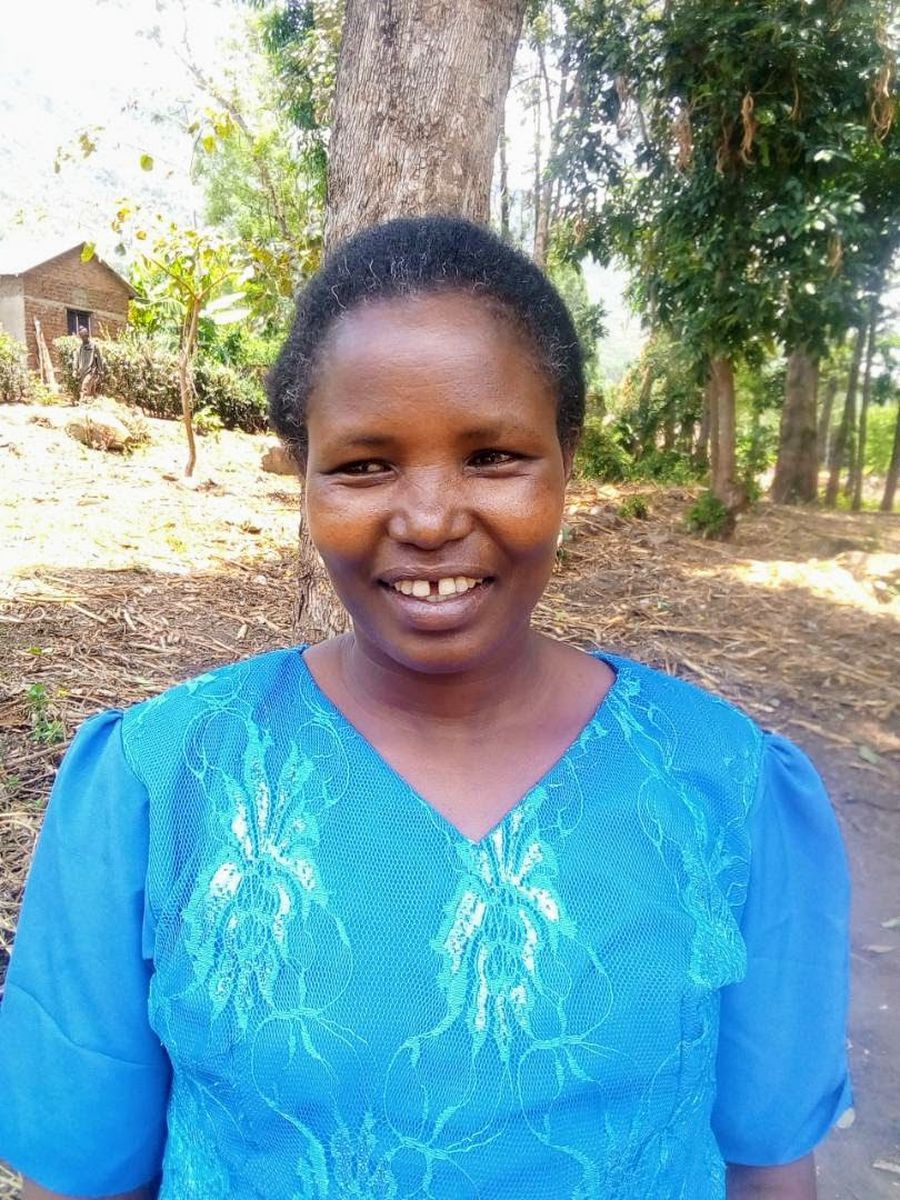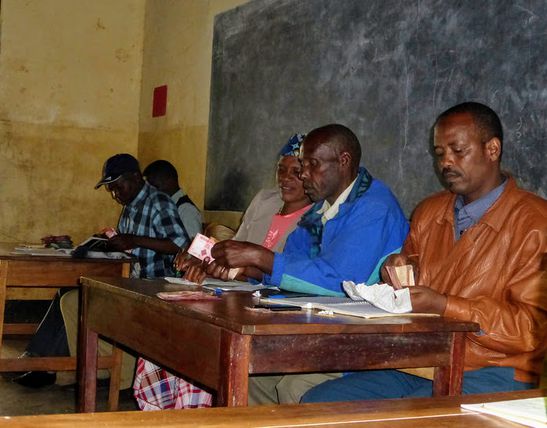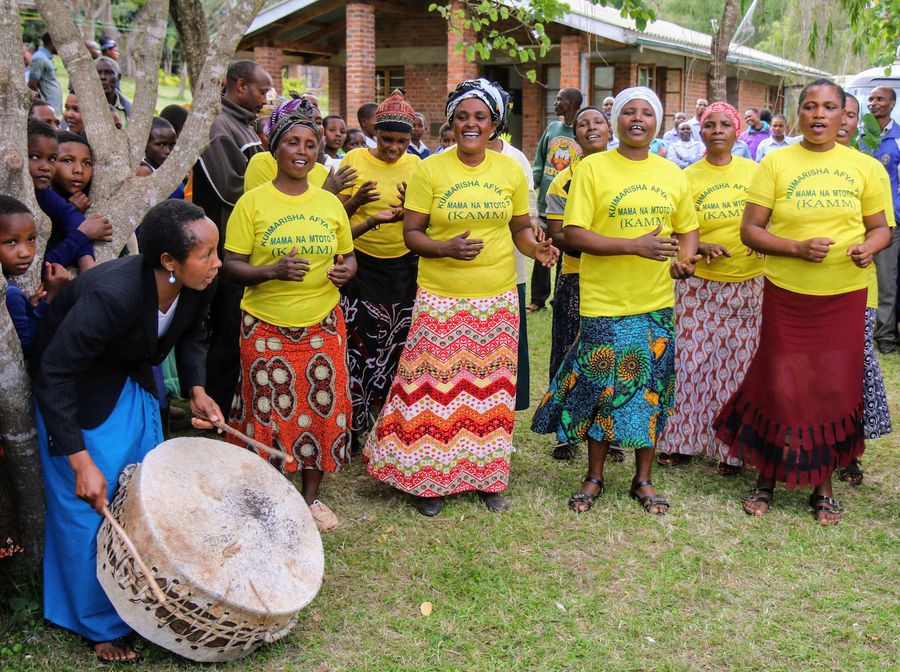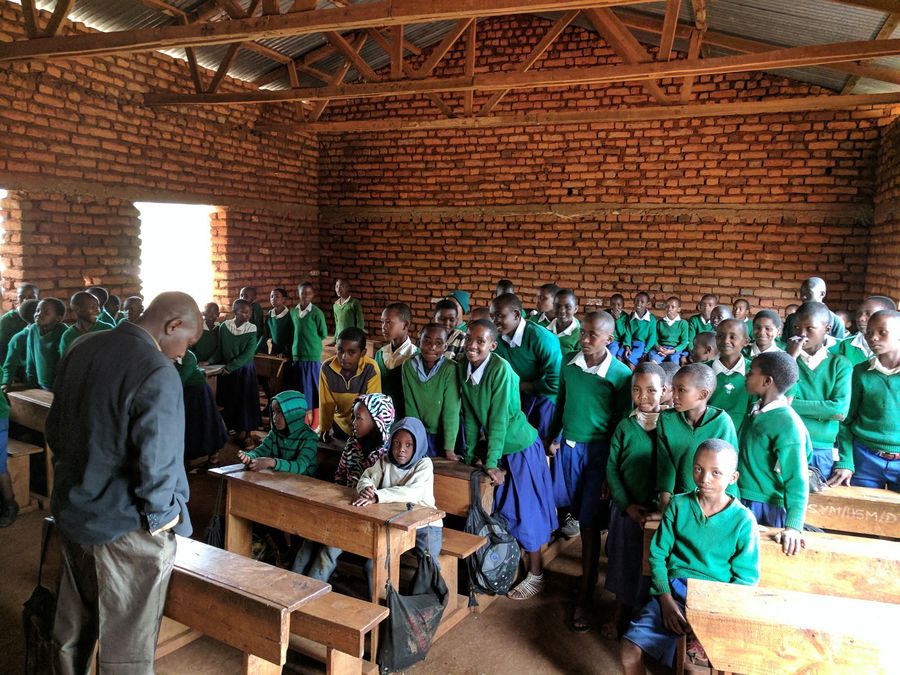
meet-community
Meet The Community
Community Leadership

Yasinta Dawite lives in Dareda Kati, the Tanzanian village where Karimu volunteers spend two weeks every year. She is a leader of the local midwives cooperative and a founding member of a microcredit group called the Ufani Agriculture Organization (UFAGRO) . She also directs her church choir and is a former member of the Ufani Primary School Committee.
She and her soft-spoken husband, Léoncé, a banana farmer and expert furniture maker, have six children, the average in rural Tanzania. Despite devoting endless hours to housework, childcare, and helping Léoncé on their farm, Yasinta makes her volunteering and community leadership work seem joyful and effortless.
The joy is clear to Karimu volunteers when they visit Yasinta and Léoncé’s home once a year to eat lunch, listen to music, and dance. The reliable catchiness of popular and traditional African songs helps the afternoon fly by, even though the hosts speak almost no English. Preparing for her guests with two days of cooking and cleaning—while attending to her family and community obligations—seems to have drained none of Yasinta’s astonishing energy.
Co-op Microlending Group

members
In 2012, 47 members of the Dareda Kati community, following a practice that has long been common in poor countries among people with scarce access to established financial institutions, founded UFAGRO (Ufani Agricultural Organization) as a co-op microlending group.
The monthly dues of eight dollars and the five percent of interest that UFAGRO collects on its three-month loans to members are recycled back into the group. At the monthly meetings, members give their dues in cash to Treasurer Daniel Amma, who then redistributes the money to successful loan applicants. At a meeting attended by Karimu’s founders, Daniel turned to them.
“Everything is transparent,” he said with evident satisfaction. “They can see that nothing goes into my pockets.”
Each loan applicant must have four co-signers, and UFAGRO’s Corruption Committee guards against misappropriation of funds. More experienced members mentor less experienced one on viability of projects. A quarter of the money collected from monthly dues goes into an “I’m Sorry Fund” that is drawn upon to support members struck by extraordinary hardship.
The scope of businesses supported by the loans, which do not exceed $250, is small. Members buy extra seed for crops or milk cows or set up tea shops. The additional earnings can pay for school uniforms, materials, or lunches, or for medicine or home repairs.
An UFAGRO member whom the Karimu founders met in 2014, Alois Mideemay, used his loan of $100 to plant extra fruit crops, the product of which he sold at the street market held every month near Dareda Kati’s town center. He spent the profits on his four children, paying for more frequent health checkups than most village children get and for a larger variety of clothes than most village children wear. Alois believed that the clothes, like the fresh coats of paint on the new classrooms and teachers’ houses that Karimu helped build, had inspired pride and motivated his children to succeed in school.
By 2017, membership had grown to 150 and average income of the initial members had tripled. Karimu has done its small part by donating a total of $10,000 to seed fund UFAGRO.
Vital Contributors

Infant deaths during birth are far too common throughout rural Africa: in Tanzania, the rate is seven times that of the United States. As serious a problem as this is, maternal deaths during birth occur almost 30 times as often as in the U.S.
Because most women in Dareda Kati live in remote locations that make hospital births inaccessible, midwives are vital contributors to the community, as they are to remote rural communities throughout the world where there is no doctor. Midwives visit homes in order to deliver babies under extraordinarily challenging conditions.
The life-affirming work of Dareda Kati’s midwives earns them respect that qualifies them for community leadership in other areas, as well. For example, Veronika Moshi, one of the most respected midwives, is an officer of the UFAGRO microlending group and has also served on the Ufani Primary School Committee.
In the summer of 2010, Dr. Susan Hughmanick, a specialist in obstetrics and gynecology, became a Karimu volunteer. She was appalled to find only one tiny, dimly-lit birthing room at the local dispensary, which had no running water and no toilet of any kind. Yet Susan so impressed by the dedication of the local midwives that when invited to join Karimu’s Board she felt privileged to do so. She believed she could contribute her expertise in this domain.
With Susan’s engagement, the midwives formed KAMM—an acronym for “Strong Health for Mothers and Children” of the group’s Swahili name—to support one another and share information. Susan and fellow volunteer Linda Presser created instructional manuals for emergency care, nutrition, and safe delivery practices. These were illustrated and translated into Swahili. Karimu’s annual refresher courses in midwife education and annual provision of clean birthing kits continue to help KAMM’s remarkable women reduce deaths during childbirth.
Bringing a better future

When Marianne and Don, Karimu’s founders, first visited Ufani Primary School in 2007, they were appalled to find classrooms with dirt floors, no glass in the windows, no doors in the doorframes, and a severe shortage of wobbly desks. Two of the four classrooms were open to the sky. The “walls” of one room were little more than pillars, waiting for the spaces between them to be filled in.
In these squalid surroundings, the teachers nevertheless wore their best dress shirts and trousers while standing in front of the students with striking dignity and composure. Like countless teachers throughout rural Africa, the Ufani Primary School teachers went every day to small classrooms packed - on those unusual days when absences were few - with as many as 75 students, who had to divide scarcities of books and supplies among themselves.
Karimu has rebuilt Ufani Primary School and addressed its shortages of books and supplies. But the teachers continue to teach from 7:15 am until 4:30 pm, amassing many more classroom hours than American teachers do. During the holidays, students must often make up their absences, so the teachers lose their time off.
Primary school teachers are passionate about their belief that education is vital to bringing a better future to their country. Their hard work has inspired Karimu to support their efforts to earn university degrees in a country where it is not unusual for a primary school teacher to lack even a high school diploma.
Before Karimu built housing for teachers on the Ufani grounds, a former Ufani teacher named Melkiory Gobre spent at least two hours a day walking between the school and the rented room where he lived. That was during fair weather, when the dirt roads were not slippery or barely passable. But once Melkiory moved into one of the new teachers’ houses, he was able to invest the two hours a day that he had regained in Karimu-sponsored distance learning, which brought him his Bachelor’s degree after three years.
Melkiory has been promoted to Head of School in Magugu, an administrative ward located north of Babati.
Meet The Community
Community Leadership

Yasinta Dawite lives in Dareda Kati, the Tanzanian village where Karimu volunteers spend two weeks every year. She is a leader of the local midwives cooperative and a founding member of a microcredit group called the Ufani Agriculture Organization (UFAGRO) . She also directs her church choir and is a former member of the Ufani Primary School Committee.
She and her soft-spoken husband, Léoncé, a banana farmer and expert furniture maker, have six children, the average in rural Tanzania. Despite devoting endless hours to housework, childcare, and helping Léoncé on their farm, Yasinta makes her volunteering and community leadership work seem joyful and effortless.
The joy is clear to Karimu volunteers when they visit Yasinta and Léoncé’s home once a year to eat lunch, listen to music, and dance. The reliable catchiness of popular and traditional African songs helps the afternoon fly by, even though the hosts speak almost no English. Preparing for her guests with two days of cooking and cleaning—while attending to her family and community obligations—seems to have drained none of Yasinta’s astonishing energy.
Co-op Microlending Group

members
In 2012, 47 members of the Dareda Kati community, following a practice that has long been common in poor countries among people with scarce access to established financial institutions, founded UFAGRO (Ufani Agricultural Organization) as a co-op microlending group.
The monthly dues of eight dollars and the five percent of interest that UFAGRO collects on its three-month loans to members are recycled back into the group. At the monthly meetings, members give their dues in cash to Treasurer Daniel Amma, who then redistributes the money to successful loan applicants. At a meeting attended by Karimu’s founders, Daniel turned to them.
“Everything is transparent,” he said with evident satisfaction. “They can see that nothing goes into my pockets.”
Each loan applicant must have four co-signers, and UFAGRO’s Corruption Committee guards against misappropriation of funds. More experienced members mentor less experienced one on viability of projects. A quarter of the money collected from monthly dues goes into an “I’m Sorry Fund” that is drawn upon to support members struck by extraordinary hardship.
The scope of businesses supported by the loans, which do not exceed $250, is small. Members buy extra seed for crops or milk cows or set up tea shops. The additional earnings can pay for school uniforms, materials, or lunches, or for medicine or home repairs.
An UFAGRO member whom the Karimu founders met in 2014, Alois Mideemay, used his loan of $100 to plant extra fruit crops, the product of which he sold at the street market held every month near Dareda Kati’s town center. He spent the profits on his four children, paying for more frequent health checkups than most village children get and for a larger variety of clothes than most village children wear. Alois believed that the clothes, like the fresh coats of paint on the new classrooms and teachers’ houses that Karimu helped build, had inspired pride and motivated his children to succeed in school.
By 2017, membership had grown to 150 and average income of the initial members had tripled. Karimu has done its small part by donating a total of $10,000 to seed fund UFAGRO.
Vital Contributors

Infant deaths during birth are far too common throughout rural Africa: in Tanzania, the rate is seven times that of the United States. As serious a problem as this is, maternal deaths during birth occur almost 30 times as often as in the U.S.
Because most women in Dareda Kati live in remote locations that make hospital births inaccessible, midwives are vital contributors to the community, as they are to remote rural communities throughout the world where there is no doctor. Midwives visit homes in order to deliver babies under extraordinarily challenging conditions.
The life-affirming work of Dareda Kati’s midwives earns them respect that qualifies them for community leadership in other areas, as well. For example, Veronika Moshi, one of the most respected midwives, is an officer of the UFAGRO microlending group and has also served on the Ufani Primary School Committee.
In the summer of 2010, Dr. Susan Hughmanick, a specialist in obstetrics and gynecology, became a Karimu volunteer. She was appalled to find only one tiny, dimly-lit birthing room at the local dispensary, which had no running water and no toilet of any kind. Yet Susan so impressed by the dedication of the local midwives that when invited to join Karimu’s Board she felt privileged to do so. She believed she could contribute her expertise in this domain.
With Susan’s engagement, the midwives formed KAMM—an acronym for “Strong Health for Mothers and Children” of the group’s Swahili name—to support one another and share information. Susan and fellow volunteer Linda Presser created instructional manuals for emergency care, nutrition, and safe delivery practices. These were illustrated and translated into Swahili. Karimu’s annual refresher courses in midwife education and annual provision of clean birthing kits continue to help KAMM’s remarkable women reduce deaths during childbirth.
Bringing a better future

When Marianne and Don, Karimu’s founders, first visited Ufani Primary School in 2007, they were appalled to find classrooms with dirt floors, no glass in the windows, no doors in the doorframes, and a severe shortage of wobbly desks. Two of the four classrooms were open to the sky. The “walls” of one room were little more than pillars, waiting for the spaces between them to be filled in.
In these squalid surroundings, the teachers nevertheless wore their best dress shirts and trousers while standing in front of the students with striking dignity and composure. Like countless teachers throughout rural Africa, the Ufani Primary School teachers went every day to small classrooms packed - on those unusual days when absences were few - with as many as 75 students, who had to divide scarcities of books and supplies among themselves.
Karimu has rebuilt Ufani Primary School and addressed its shortages of books and supplies. But the teachers continue to teach from 7:15 am until 4:30 pm, amassing many more classroom hours than American teachers do. During the holidays, students must often make up their absences, so the teachers lose their time off.
Primary school teachers are passionate about their belief that education is vital to bringing a better future to their country. Their hard work has inspired Karimu to support their efforts to earn university degrees in a country where it is not unusual for a primary school teacher to lack even a high school diploma.
Before Karimu built housing for teachers on the Ufani grounds, a former Ufani teacher named Melkiory Gobre spent at least two hours a day walking between the school and the rented room where he lived. That was during fair weather, when the dirt roads were not slippery or barely passable. But once Melkiory moved into one of the new teachers’ houses, he was able to invest the two hours a day that he had regained in Karimu-sponsored distance learning, which brought him his Bachelor’s degree after three years.
Melkiory has been promoted to Head of School in Magugu, an administrative ward located north of Babati.


